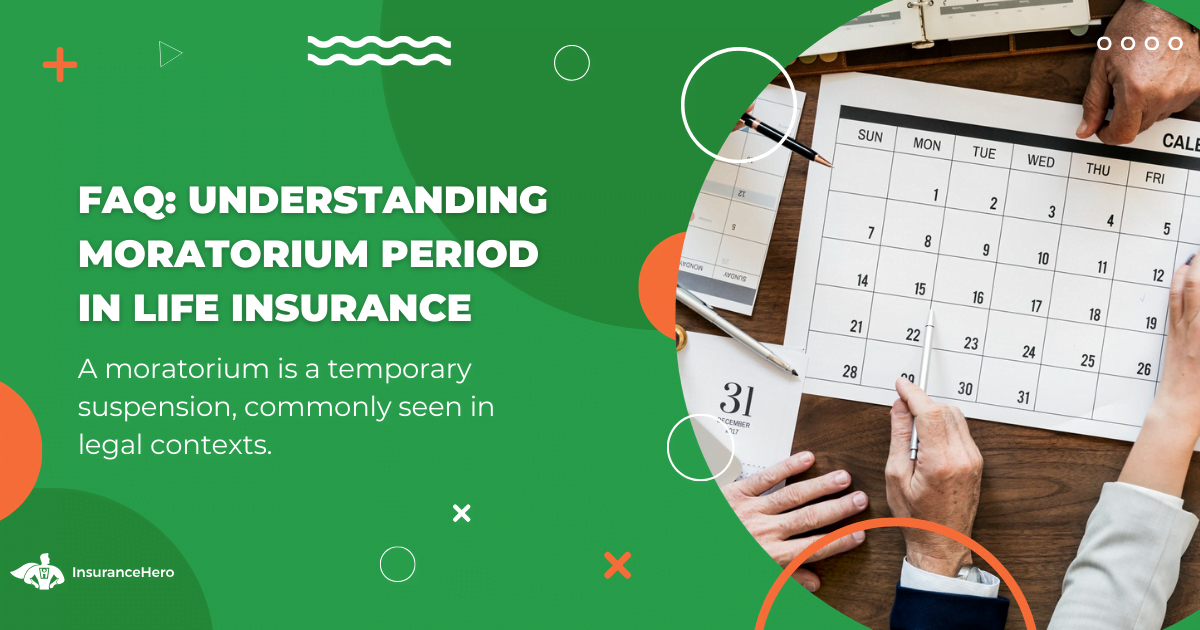What Is The Moratorium Period In Life Insurance?

In legal terminology, a moratorium is a specific waiting period or suspension of an activity for a duration.
During that duration, evaluations occur until further consideration determines that the original activity can continue.
A prime example many UK residents saw was the Covid-era moratorium on no-fault evictions, meant to help protect people and keep them more secure during times of hardship.
What about life insurance coverage? What is a moratorium period in life insurance, and how does it apply to life insurance coverage in the UK?
What is a Moratorium Period for Life Insurance Coverage?
When you purchase life insurance coverage, depending on the kind of policy and the provider you receive it from, there may be a waiting period before it fully kicks in. This is the moratorium period.
If your policy is subject to a moratorium period, and you die within that period, your benefits will not be paid out on a claim.

Once the moratorium period has passed, you transition to fully covered, and any reason for your passing will be eligible for a claim on your death benefits, barring specific exceptions outlined in your policy.
Why Do Life Insurance Policies Have Moratorium Periods?
Life insurance policies have moratorium periods to prevent abuse.
Insurance providers exist in a state of perpetual gambling. They use statistics to determine the risk of a policy and balance the benefits they offer with the premiums they charge and the risk of the insured passing away during the covered term.
Everyone who outlives their cover is a “win” for the insurance provider, while anyone who passes and whose benefits are paid out is a “loss.”

A moratorium exists to prevent people who are terminally ill from signing up for life insurance coverage immediately preceding their death and getting the full benefits from that coverage. It also generally prevents a payout from suicide and, should it be made legal in the future, medically assisted dying.
After all, a life insurance provider couldn’t remain financially solvent and able to pay out for the individuals they cover if it pays out more than it makes through intentionally-timed abuse.
It’s important to note that for policies requiring you to answer a medical questionnaire, you have to be honest about it because if you have a pre-existing condition that would disqualify you under normal circumstances. If it comes to light that you lied about having it, it’s considered fraud and will result in a denied claim on your benefits.
Don’t Let Waiting Periods Delay Your Protection—Compare Life Insurance Quotes Today

Are There Exceptions to the Moratorium?
Typically, yes. A moratorium period typically only exists for certain kinds of life insurance coverage.
We’ll get to that more in a moment. More specifically, for any policy that has a moratorium period, the moratorium generally only applies to death by natural causes or through intentional acts.
Accidental death – such as dying in an auto accident, building fire, or other incident – is still covered. Since a moratorium exists to prevent abuse of the system, and an accidental death is not intentional abuse, it’s still covered.

As with anything related explicitly to exceptions and terms in a policy, you should check the actual documentation for your cover. There may be specific details or exceptions outside the norm that are worth knowing, either before you sign up for cover or if you’re worried about what is and isn’t covered.
What is a Pre-Existing Condition?
In medical terms, a pre-existing condition is any health condition or concern that you suffer from prior to applying for coverage. It’s much more commonly seen in terms of medical and health insurance rather than life insurance.

Typically, a pre-existing condition is anything that you have experienced the symptoms of, received advice or treatment for, taken medication for, or have had diagnostic tests for before applying for cover.
This applies regardless of whether or not you’ve had an official diagnosis by the time you apply for cover.
Often, a condition can no longer be recorded as pre-existing if you have managed it well enough to be “cured” for two years before applying for cover.
So, for example, if you had the symptoms of pre-diabetes but made lifestyle and dietary changes to address them and are once again in good health with no signs of that diabetes for two years, you won’t be treated as having that pre-existing condition when you apply.
Does the Moratorium Period Apply to All Life Insurance?
No. In fact, it doesn’t apply to most forms of life insurance.
The only forms of life insurance that usually have a moratorium period are those with guaranteed acceptance.
These generally fall into general guaranteed acceptance policies and over-age policies. The over-age policies are the most common.
An overage policy is usually found as an over-50s policy. There are also more specific age policies, including those over 60 and over 70 plans. These all work the same way, just with different financial terms.

An over-age policy is a cover that is only available if you’re already over the stated age. So anyone aged 50 to 80 can qualify for over-50 coverage. Over-60s is from 60 to 80, and so on.
These policies are guaranteed cover. Unlike traditional term or whole life insurance cover, which can decide not to offer you a policy if you don’t meet their thresholds for health, age, and other factors (broadly, risk), a guaranteed cover will be guaranteed.
The cost of the cover, the amount of benefit they offer, and the moratorium period will vary, but you won’t be denied a policy.
So, generally speaking, if you’re age 50 and apply for an over-50s policy, you will be granted that policy right away.
Then, you will be in the moratorium period for the first up to two years after receiving cover. During this period, your benefits only pay out if you die from accidental causes. Your benefits won’t be paid out if you pass away from other causes, like a pre-existing condition.
Once you reach age 52 and two years have passed since your cover started, you’ll be out of the moratorium period, and any reason for passing away (barring those prohibited by the terms of your policy) will result in a valid claim.
How Long Does a Moratorium Period Last?
This generally depends on the combination of your average health and risk profile, your current age, and the provider of your life insurance policy.
At the low end, a moratorium period may only last about six months from signing up for cover. This is most likely if you’re on the younger end of the spectrum for guaranteed cover and you have no ongoing pre-existing conditions – in other words, you’re at generally low risk of dying for your age cohort.

At the high end, a moratorium can last up to two years. This is for older people and people with pre-existing conditions. Also, many life insurance providers set a standard moratorium of two years and apply it to everyone.
The exact details of your policy and your moratorium period can vary, so be sure to talk to a representative of your insurance company to determine the relevant details for your policy.
What Happens if You Pass Away During the Moratorium Period
If tragedy strikes and you die shortly after getting life insurance coverage but before the moratorium period is up, what happens? This depends on how you passed away.
Typically, if you pass away from accidental death, you will be treated as though you’re fully covered, and your benefits will pay out as normal.
This can depend on your cover – some, for example, may have benefits that increase over time, so you’d be on the low end of vested payments, and your benefits can be low. Others will pay the full amount regardless.
On the other hand, if you pass from a pre-existing condition, natural causes, or another specified cause, you will fall into the moratorium exception. In these cases, your death benefits do not pay out.

However, many insurance providers will return any premiums paid towards the policy instead. It’s cold comfort for those with policies with £5 per month premiums – a payment of under £100 isn’t much – but it’s slightly better than nothing.
Some providers don’t do this either, so it’s essential to know the specific terms of your policy.
How Does a Life Insurance Moratorium Differ from a Health Insurance Moratorium?
If you’ve spent any time looking up what a moratorium is for life insurance, chances are you’ve found a lot of resources about health and medical insurance instead. It’s similar to but different from, life insurance moratoriums.
With medical insurance, you can apply for cover with either full underwriting or moratorium underwriting. Full underwriting requires you to complete a questionnaire about your health, allowing the insurance provider to adjust premiums and benefits or even deny coverage.
They may also offer cover but will specifically not cover pre-existing conditions.

Conversely, moratorium underwriting allows you to skip the questionnaire and get coverage immediately.
However, suppose you need to use that cover for a condition. In that case, you’ll need to complete a questionnaire and allow the insurer to interview your GP to determine whether the issue you want covered is a pre-existing condition. If it is, they can deny your claim.
Before medical cover starts covering a pre-existing condition, you need to go two years without receiving testing or treatment.
For some, this means changing lifestyles and fixing health issues to address the problem; for others, it simply means suffering for years before being able to receive treatment.
So, while it is still related to pre-existing conditions, there’s not much crossover between how these moratoriums work. You can read more about the medical insurance moratorium here.
If You Have a Pre-Existing Condition, Is Life Insurance Worthwhile?
Suppose you already suffer from a pre-existing condition and find that it, plus your age, usually means that traditional term life insurance tends to deny your applications for a policy. Is it worth seeking out over-50s or guaranteed cover of some kind?
Generally, the answer is yes. Over-50s policies have guaranteed acceptance, as well as fixed, usually low-cost premiums. The moratorium period can be a drag, but unless you’re already terminally ill, the chances of you making it past two years are honestly quite high.
The downside to these policies is that the coverage you receive is often capped.

Typically, these policies have death benefits capped at around £20,000 to £30,000. However, some can go much higher, and we’ve seen coverage that reaches as much as £1,000,000.
For a more thorough evaluation of over-50s life insurance cover, read our guide here.
How Can You Get the Best Possible Life Insurance Coverage?
If you’re realising that you’re getting older and wondering how to handle wrapping up your affairs when you pass away, life insurance coverage is generally a great idea. For a small monthly premium, you can build up a benefit that pays to your spouse, family, or other beneficiaries when you are no longer around.
That money can be used for anything from paying off your mortgage to repaying outstanding debts, covering funeral expenses, to helping build financial independence with your loved ones and family.
The question is, how do you find the best cover?

While a guaranteed acceptance policy is always an option, it may not be your only option. That’s why we offer our free quote service.
Fill out this form, and we will offer you quotes for cover from many of the top insurers in the UK. You can then evaluate their different kinds and levels of cover and decide what option is best for you.
Don’t let great coverage slip through the cracks. Get all the best quotes in one place, and make sure you’re fully prepared for the future, whether or not that future has you in it.
Steve Case is a seasoned professional in the UK financial services and insurance industry, with over twenty years of experience. At Insurance Hero, Steve is known for his ability to simplify complex insurance topics, making them accessible to a broad audience. His focus on clear, practical advice and customer service excellence has established him as a respected leader in the field.


